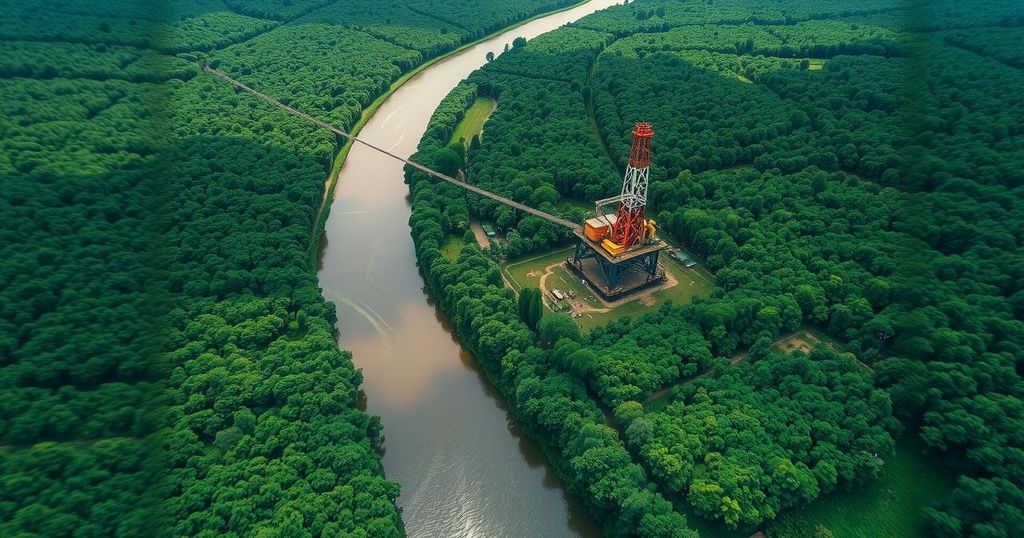Companies
Technology
AGENCY, AMAZON, AMAZON RIVER, AP, ARAYARA, ASSOCIATED PRESS, BRAZIL, BRAZILIAN INSTITUTE OF THE ENVIRONMENT AND RENEWABLE NATURAL RESOURCES, CHEVRON, CNPC, ENERGY, EX, EXXONMOBIL, IBAMA, LU, LUIZ INÁCIO LULA DA SILVA, MINING, NATIONAL OIL AGENCY, NICOLE OLIVEIRA, OFFSHORE DRILLING, OIL AND GAS, OIL PRODUCTION, OLIVEIRA, PETROBRAS, RIO DE JANEIRO, SOUTH AMERICA, THE ASSOCIATED PRESS, U. N
Leila Ramsay
0 Comments
Brazil Auctions Oil Sites Near Amazon Despite Environmental Protests
Brazil auctioned off oil blocks near the Amazon, igniting protests from environmentalists and Indigenous groups. Critics warn of ecological risks and contradictions to Brazil’s environmental commitments, especially with U.N. climate talks approaching.
In a significant move, Brazil auctioned several onshore and offshore oil blocks near the Amazon River on Tuesday, despite ongoing protests from environmentalists and Indigenous communities. This controversial auction comes just months before Brazil is set to host U.N. climate talks in the Amazon, raising further concerns over its environmental implications. Outside the auction venue, demonstrators voiced their worries about the serious threats to both ecosystems and Indigenous populations posed by potential oil drilling activities.
Held at an upscale hotel in Rio de Janeiro, the auction was managed by Brazil’s National Oil Agency. A total of 172 oil blocks were on the auction block, largely in unexplored areas, including 47 offshore parcels near the mouth of the Amazon and several inland sites close to Indigenous lands. Nine offshore blocks were acquired by major oil players such as Chevron, ExxonMobil, Petrobras, and CNPC. These companies are keen on exploring these regions, which they believe share promising geological traits with oil-rich Guyana.
Critics highlight that these areas come with significant risk, citing strong currents and their location near vulnerable ecosystem zones. Under substantial public pressure, the Brazilian Institute of the Environment and Renewable Natural Resources, or IBAMA, recently gave Petrobras the go-ahead to initiate exploratory drilling after approving an emergency plan, which marks a controversial step toward granting environmental licenses.
Nicole Oliveira, executive director of the environmental nonprofit Arayara, expressed deep concerns regarding the auction, stating, “It’s regrettable and concerning that blocks are being acquired in a basin that has not yet received environmental licensing.” She continued by denouncing the actions of the National Oil Agency as reckless and reiterated plans to continue legal battles to halt any contracts that result from the auction.
The auction concluded with 34 oil blocks awarded, raking in $180 million in signing bonuses. Notably, one block near the Amazon’s mouth was purchased at a staggering markup of nearly 3,000%. Protesters, including around 200 environmental activists and Indigenous leaders, gathered outside the event, voicing their opposition. “We came to Rio to repudiate the auction,” said Giovane Tapura from the Manoki tribe. “We would have liked to be consulted and to see studies on how the oil drilling could affect us. None of this has been done.”
The National Oil Agency defended the auction, touting it as part of Brazil’s commitment to diversifying its energy sector as it aims for a low-carbon economy. The agency promised measures to reduce carbon emissions and investments in transitioning to greener energy sources. Brazil’s crude oil production has surged, surpassing soybeans as the nation’s top export last year. The federal government is targeting an expansion of oil output as production from existing sites is expected to decline post-2030, despite the country’s heavy reliance on hydropower and other renewable energy sources.
As Brazil prepares to lead climate conversations in Belem, many believe President Luiz Inácio Lula da Silva’s push for increased fossil fuel output undermines his environmental leadership claims. Claudio Angelo from Climate Observatory criticized the situation, stating that Brazil is compromising its position ahead of the climate talks. “The Brazilian government is endangering everyone’s future since science has been crystal clear about the need to stop the expansion of fossil fuels everywhere in the world,” he pointed out, adding pressure on the government to rethink its strategy.
In summary, Brazil’s recent auction of oil blocks near the Amazon has ignited significant outcry from environmentalists and Indigenous leaders concerned about the ecological and social ramifications of increased oil production. As the nation prepares for global climate discussions, critics argue that this auction serves as a contradiction to Brazil’s commitment to environmental preservation and responsible resource management. The immediate future remains uncertain, as legal challenges and public discontent may further shape Brazil’s energy policies amid global climate awareness.
Original Source: www.kob.com




Post Comment